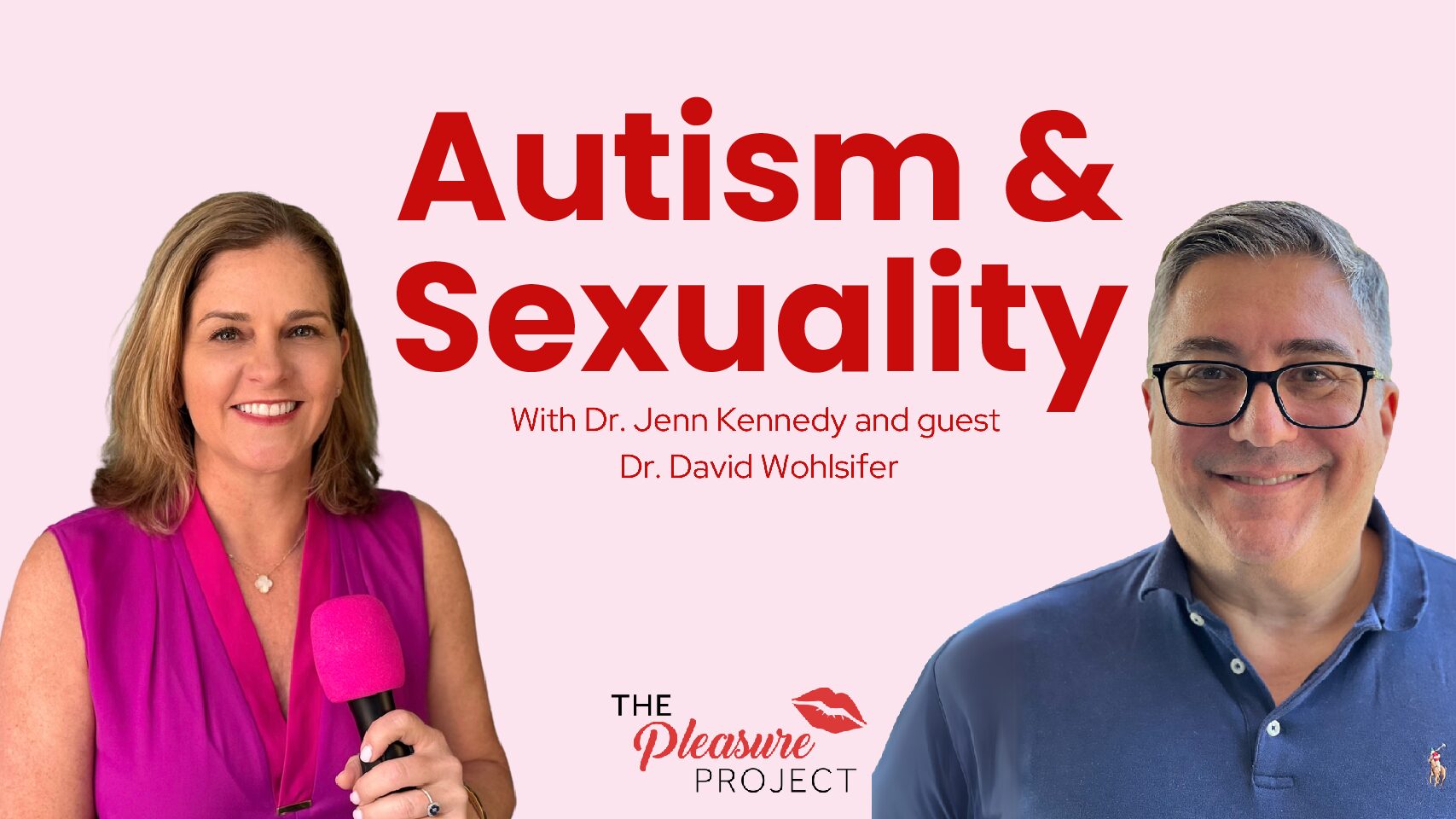Navigating Changes, Enhancing Intimacy Midlife, typically defined as the period between ages 40 - 65,…

Autism & Sexuality
Autism & Sexuality
written by Bennett Aguirre
In this episode of Pleasure Project: Sex and Relationships, Host Dr. Jenn Kennedy asked Guest Dr. David Wohlsifer to return–this time to discuss a topic she is seeing more and more in her clinical practice as a sex therapist: autism and the unique experiences autistics face exploring their relationships and sexuality. This episode is not only valuable for those who identify within the autism spectrum, but also for those with friends or partners who identify as neurodivergent and who want to navigate their relationship better.
What is Autism?
Autism Spectrum Disorder, some use the term autism or neurodivergent, is a neurodevelopmental disorder that affects the way people think and interact with others. This affects a wide scope of people and can be experienced differently for individuals who have it. Dr. Wohlsifer explains that, “You meet one person with autism, you’ve met one person with autism, [it] doesn’t all look the same” (Wohlsifer, 3:49). Individuals with autism deal with a number of challenges that can span from anxiety, social pressures, and communication to behavior challenges and masking. It’s important to note that the diagnosis process for autism can be quite complicated as women oftentimes get overlooked more for signs of autism compared to men. Dr. Jenn brings up that, “so many of those traits that are associated with autism in children get missed in women and girls” (Kennedy, 27:24). Recognizing that these can get overlooked leaves us with many people who are now trying to adhere to a neurotypical world with a neuroatypical mind, also known as masking. Autism is not one size fits all, and the uniqueness of each individual who identifies with it is what makes the spectrum diverse and full of perspectives worth understanding.
Understanding Autism in Relationships
Coupleships, where neurodiversity is present for one or both partners, are going to work differently in certain ways. This can potentially create conflict. For example, sensory issues (light, sound or volume sensitivity, tactile reactions to clothing or environments) can be challenging for those who are neurodivergent, which can create confusion for their partner and thus tension in a relationship. If one person has an aversion to smells or certain foods and the partner doesn’t understand these triggers, then it can lead to problems or the autistic partner being labeled as difficult, picky and seen as rigid. As a result it can trigger feelings of rejection or misunderstanding, likely taken back to a time in their early years when they were disregarded in some way. Dr. David Wohlsifer explains that, “…the partner that is autistic or neurodivergent is being shut down and it brings them back to a place in their childhood where they felt diminished and shut down” (Wohlsifer, 08:51). It’s important for the couple to work towards understanding these differences and empathize with one another. Understanding these issues and talking through them can help both individuals see how they are wired differently and how they can work together instead of squabbling over which way is “right”.
Intimacy Considerations Through a Neurodivergent Lens
Understanding how neurodifferences can be outside of the bedroom can tell us why there might be differences within the bedroom. For example, autistic folks tend to value routine, therefore spontaneity in the everyday (or in the erotic) can prove off putting or unsettling for the neurodivergent partner. Additionally, they might get criticized for lack of eye contact, which can be read as distracted or disrespectful, when in reality, it’s more of a coping with a society expectation that feels incredibly intense, which can prove stressful for the autistic partner. Having some awareness of this larger frame can help both partners set reasonable expectations for one another socially and intimately.
Tune into the full episode here. If this episode brought up feelings of discomfort, curiosity etc., then don’t hesitate to reach out to Riviera Therapy for a well-rounded counseling experience.
Dr. David Wohlsifer is a clinical instructor at Florida Atlantic University, as well as a couples and family therapist, working with CBT, substance abuse disorders, EMDR, and sex therapy.
More to Consider
“Trans & Nonbinary Sexuality with Dr. Damon C.”
Join this discussion on unpacking trans and nonbinary sexuality, as well as the queer population overall.
“Love by Design w/ Dr. Sara Nasserzadeh”
Learn how to navigate the challenging topic of love, one that is unique and extremely complex, in this riveting conversation.
“Guide to Sex Ed with Trish Hecker”
Have you ever thought to yourself that you wish we had more sex education? Then this episode is well worth a listen.




This Post Has 0 Comments